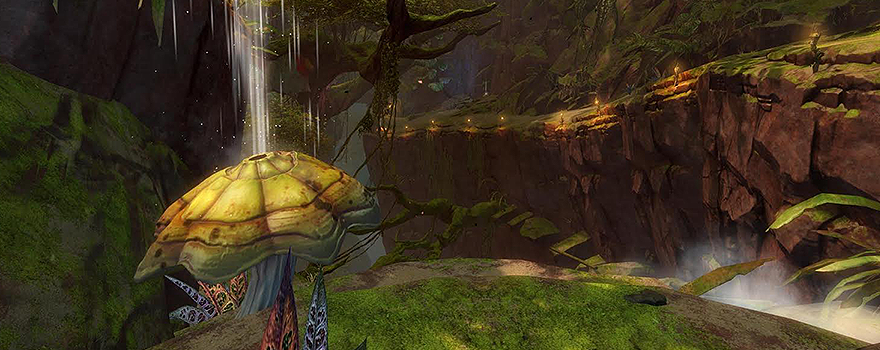
I’ve had the whole weekend with Heart of Thorns now, and I’m progressing very nicely in both the story and masteries. I’ve still yet to unlock an elite specialization, but I’m not actively chasing Hero Points at this stage because I’m putting so much effort into event chaining, furthering my personal story, and grinding experience. There’s so much to do that I know it’ll take me weeks and weeks to feel on top of things again, which is the perfect way to feel when a new expansion has just launched.
Many people have concerns with how Guild Wars 2‘s first expansion’s progression is structured, though, so I’m dedicating this launch diary entry to dissecting the mastery system and discussing if there are ways in which we can contextualise the system and also minimise those complaints.
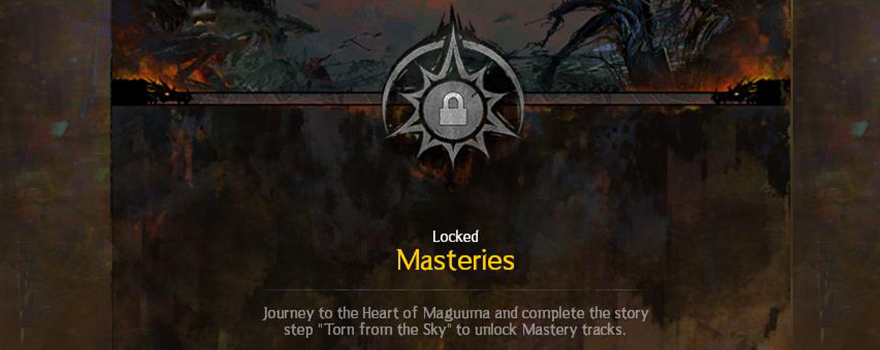
The problem in a nutshell
Plenty of players have voiced their dissatisfaction with how much experience it takes to unlock each mastery tier since Friday’s HoT launch. I’m going to kick off this section by pointing out that I don’t find masteries to be a grind in and of themselves: The clue is in the name, folks, and I don’t think we need to look much further than the interview I conducted with Lead Designer Crystin Cox at Gamescom to see that these extra skills are intended to take a long time to master. She explained the intent of the mastery system back in August:
We were really inspired by classic games such as Metroid and Zelda and wanted to do something that felt rewarding in that way. When you get an ability in those games it opens up a new world for you, and we wanted to capture that feeling in an MMO. That’s where the mastery system came from. We want our in-game progression to be about earning abilities that actually make a difference to what you’re doing in the game by opening up more of the game for you, especially when it comes to Heart of Thorns and the new area we’re adding. We worked very hard with the content designers to make sure that it felt like the things you’re getting with the mastery system are very contextual and impactful for what you’re doing in that region by opening up new content and abilities that are more meaningful than numbers going up.
After speaking with Crystin, I was most definitely not surprised that each mastery level requires a significant amount of exposure to specific zones in order to unlock because this is exactly what makes each mastery unlock feel so impactful. Before I even had my first mastery unlock completed, I could see exactly what I was missing by not being able to glide, bounce, or converse in native tongues, and it most definitely spurred me on to explore and learn. Where the real issue with these unlocks lies for me is in the way the system is linked to story progression: Certain personal story chapters have mastery prerequisites that I find jarring and immersion-breaking.

ArenaNet listened to our grievances and met us halfway
ArenaNet has partially addressed this complaint by removing the rather harsh requirement of needing a tier four mastery for one of the personal story chapters, which goes a long way to making players feel less annoyed by how much effort it takes to unlock the masteries. Players who passed Chapter 14 within the first two days would have had to sink time into earning Itzel Poison mastery, a tier four mastery that requires all the previous tiers in the Itzel chain to be unlocked.
Adding it all up and presuming you worked solely on the other masteries required for the story up to that point, that would make a minimum spend of eight full XP bars and sixteen mastery points to simply experience the expansion’s storyline. By cutting that Itzel Poison requirement, the damage lessens to five full XP bars and six mastery points, which is clearly much easier to achieve than the original prerequisites.
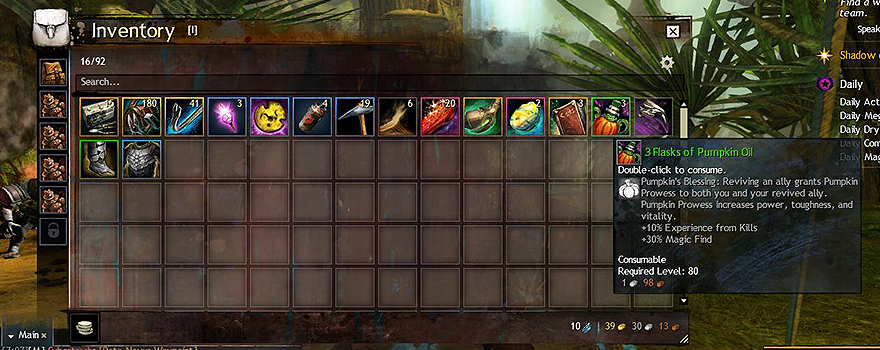
Training masteries the easy way
Players can make the XP grind for masteries much easier on themselves, both in terms of the time needed and the likely enjoyment derived from the activity, by running the event chains in each new zone. By doing so, you’ll find great safety in numbers because many players will be doing the same, and you’ll also pick up some nice loot on the way via drops and rewards. There’s plenty of flax to be found as you escort NPCs, and crafting materials can be stumbled upon this way too.
You can also lessen or perhaps even bypass the XP seeking in order to get back to the story by using up all the experience boosters you’ll inevitably have lying around in your bank vault, or maybe try equipping an ascended amulet with an experience infusion to give you a nice 20% boost. This is fairly affordable too with only a small laurel cost of 30 for the amulet and 10 for the infusion. Don’t forget that it’s Halloween time too: Flasks of Pumpkin Oil grant both your character and a fallen comrade that you revive an experience boost, among other nice temporary perks.
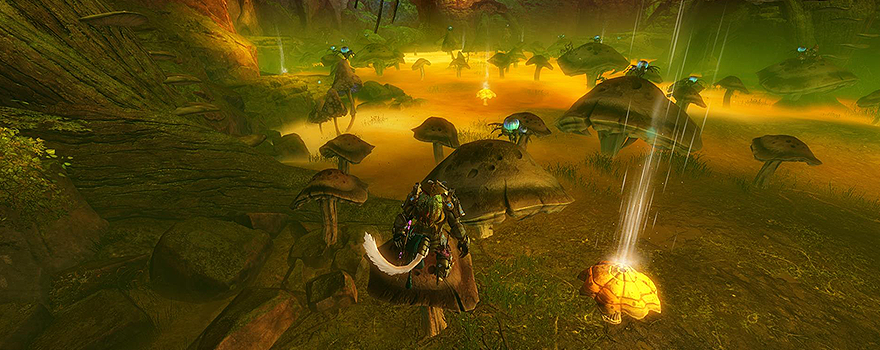
The logic behind masteries
To be honest, I’m actually enjoying the fact that I know I have plenty of exploration to come over the next long while as I gain a better sense of the new environment and the secrets it holds. I don’t know about you, but I don’t think I could wander into a hostile and exotic new locale and be totally attuned to its ways in only a short while, so I’m happy that the in-game masteries follow a somewhat realistic sort of logic. Many of those who are currently frustrated over the mastery system are explorers at heart who love being able to see a vast amount of new areas in a short amount of time.
I adore roaming about in Tyria myself, and I know that it feels natural to be able to go anywhere my characters’ little feet can take them without much effort, completing each separate area to 100% before moving on. What we need to realise, however, is that in Heart of Thorns we’re not going for a simple ramble about on open planes. We are playing highly skilled commander characters who are on an almost impossible mission to eradicate one of the largest threats ever faced in all of Tyria’s colourful history. We’re entering deep enemy territory that is as alien to us as Mordremoth is, and it makes sense that we won’t have a natural, innate mastery over our surroundings in that context.
Rather than seeing zones as entire blocks to be methodically explored and unlocked, we should rather see a dangerous, hastily carved, and clumsy path through an inhospitable area that we take at first to learn more so we can eventually brave the wilds. Sure, without masteries we cannot go everywhere we wish to, but as we gain more understanding of what lies off the beaten track, a whole new world unlocks for us. That’s a very exciting idea, and it makes my mushroom jumping, glider swooping trips all the sweeter. I appreciate that I need to find my feet first before I’m able to run amok among the strange native flora or unfurl my wings and take flight into the jungle canopies.
Relying on the few allies we can find in the Heart of Maguuma is our one route to success against Mordremoth, and those allies need to be won over. It takes time to convince those peoples to trust us: We could very well be another invader, and we see that play out as we roam around the jungle. Masteries represent friendships being made, bonds being created, languages being traded, and secrets being shared, and there’s no rushing that kind of interaction. I dislike when NPCs hand characters absolutely anything they desire after only setting eyes on them for the first time, and this is a very elegant solution to that particular RPG problem.
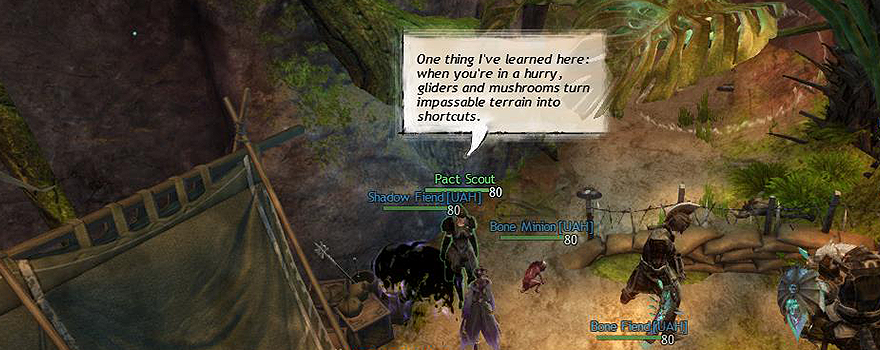
Is it really a grind, or is it simply a new form of progression?
Progression can take many forms, yet relatively few MMOs have tinkered with types that don’t involve numerical gain or stat manipulation. We aren’t as used to thinking about the things our character must learn or overcome to progress as we are about the stats we can boost for success. The approach will take a little getting used to, but when I consider that masteries are account wide, I don’t see it as a grind at all, but rather as a way to measure how well my characters understand their new surroundings.
Experience is a clever way to feed into the mastery system because it is an actively gained attribute that allows this particular horizontal progression technique to resemble a numerical system with which players might be better acquainted. We can watch the bar and see our progress without needing to min/max stat blocks or number crunch, safe in the knowledge that our progress will be permanent and tangible in the game world. In short, I don’t see the mastery system as a grind, but rather as in-game learning and horizontal progression.
I’ll be looking at some new issues that centre on the in-game economy in my next diary entry, so be sure to check back soon to read about fractals, dungeons, and crafting. In the meantime, get caught up on all our Guild Wars 2: Heart of Thorns launch diaries to date:

